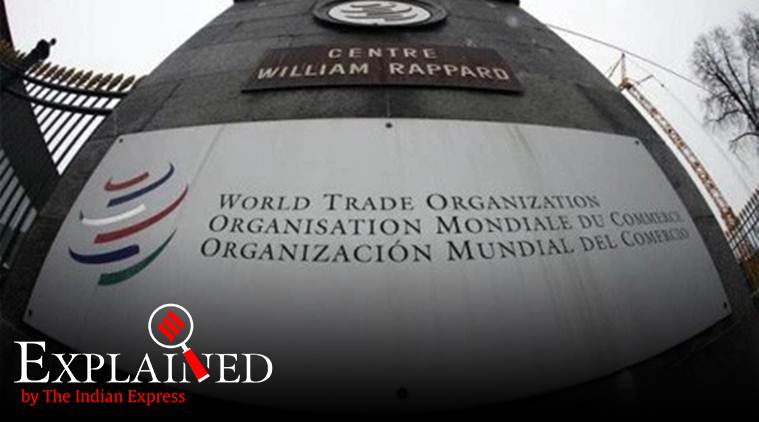A World Trade Organisation (WTO) panel recently ruled against India in a trade dispute over its subsidies to exporters under various schemes.
If the panel’s ruling is adopted, the decision is expected to put at risk export subsidies claimed to be worth over $7 billion.
Why was India taken to the dispute settlement panel?
The US in March 2018 challenged export subsidies provided by India under five sets of schemes — Export-Oriented Units, Electronics Hardware Technology Park and Bio-Technology Park (EOU/EHTP/BTP) Schemes; Export Promotion Capital Goods (EPCG) Scheme; Special Economic Zones (SEZ) Scheme; Duty-Free Imports for Exporters Scheme (DFIS); and Merchandise Exports from India Scheme (MEIS).
The US had alleged these schemes violated certain provisions of WTO’s Subsidies and Countervailing Measures (SCM) Agreement that prohibit subsidies that are contingent upon export performance. According to the agreement, India was only exempt from this provision until its Gross National Product per capita per annum reached $1,000.
The export subsidies under most of the challenged schemes, except for MEIS, consist of exemptions and deductions from customs duties and other taxes. The subsidies under MEIS consist of government-issued notes (“scrips”) that can be used to pay for certain liabilities vis-à-vis the government and are freely transferable, according to the WTO dispute settlement panel.
The US argued these subsidies were a detriment to American workers and manufacturers. When consultations with India did not work out, the US in May 2018 requested that a dispute settlement panel be set up.
What was India’s defence?
India argued that certain provisions under the SCM Agreement, allowing for special and differential treatment of certain developing countries, excluded it from the provisions prohibiting export subsidies. It also argued that all the challenged schemes, except the SEZ scheme, adhered to a provision of the SCM Agreement that carves out exemptions from or remission of duties or taxes on an exported product under certain conditions.
On what grounds did the panel rule against India?
The panel found the US had “demonstrated the existence of prohibited export subsidies” that were inconsistent with provisions of the SCM Agreement. It recommended that India withdraw certain “prohibited subsidies” under the DFIS scheme within 90 days; under the EOU/EHTP/BTP, EPCG and MEIS schemes within 120 days and under the SEZ scheme within 180 days from the adoption of its report.
BEST OF EXPRESS
LIVE
Maharashtra: Sharad Pawar to hold key NCP meet on Shiv Sena proposal
India-China business forum called off, no visas for Chinese team
Heard in BJP corridors: How will Shiv Sena explain betraying mandate & Hindutva plank
According to the panel, the US was able to show that India had foregone revenue through exemptions and deductions from duties and other taxes to the benefit of exporters in most schemes. In the case of MEIS, it was able to establish that exporters benefited from a direct transfer of funds through the provision of scrips. MEIS, because of its design, structure and operation, did not meet the conditions for the exemptions from these prohibitions as well, according to the panel.
The panel found that the US had established that most of the measures under the other four schemes (EOU/EHTP/BTP, EPCG, SEZ and DFIS) were “contingent in law upon export performance”. It also found that, as there was no dispute that India had graduated from the special and differential treatment provision that it originally fell under in the SCM Agreement, it was no longer excluded from the application of the prohibition on its export subsidies. It concluded that “no further transition period” was available to the country to stop these subsidies.
Not all the US’ arguments were accepted. The panel rejected some of its claims regarding certain customs duty exemptions provided under the DFIS scheme and excise duty exemptions under the EOU/EHTP/BTP schemes.
Who will be impacted if these “prohibited subsidies” are withdrawn?
These subsidies were worth over $7 billion annually and benefited producers of steel products, pharmaceuticals, chemicals, information technology products, textiles and apparel, according to the office of the US Trade Representative. While there will be no retrospective impact, India would have to stop providing the subsidies in this form. However, some experts say India can tweak the schemes to support exports while making them more WTO-compliant.
Some ways that India can continue to support exports, according to these experts, is by providing tax concessions (like concessions on GST) on parts and components used in the production of the exported product.
The government has already begun work on making some of the debated schemes more WTO-compliant. In September, it announced the Remission of Duties or Taxes on Export Product to replace the MEIS as a more WTO-compliant scheme. The overall duty foregone under this scheme is expected to be “more or less the same” as MEIS (around Rs 40,000 crore-45,000 crore annually).
What happens next?
India plans to appeal the report on some aspects of law and legal interpretation before the panel’s report is adopted within 60 days of it being circulated with all members. While the US is expected to push for early adoption, if India’s notice to appeal the report is submitted before this, it stands a chance of challenging this ruling.
In this particular situation, with the dispute panel’s appellate mechanism expected to become dysfunctional after December 11 (when two of the three remaining members of the body will retire), India may not be obligated to implement the panel’s current ruling.
This is because, if its appeal is submitted on time, it will join a pipeline of 10 other appeals in other WTO dispute cases that have been filed since July 2018. Until those appeals are cleared and India’s own appeal is resolved, the country will be under no legal compulsion to make the changes recommended in the dispute settlement panel’s current report, according to experts.
Published On : 11-11-2019
Source : Indian Express

